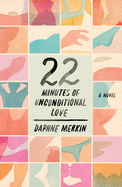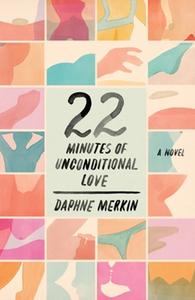
 Early on in Daphne Merkin's 22 Minutes of Unconditional Love, the narrator--a writer and a married woman who's pregnant with her second child--says this from her perch in the early 2000s: "I've been meaning to write this book for years.... It's for myself, of course, that I tell it but also for all of you who have stumbled into this kind of twisted love--love indistinct from obsession--and reeled from its force." Readers may consider Merkin's novel a fascinating look at human psychology, especially if they are intrigued by the notion of sadomasochism and admire Dr. Freud. As for those who find 22 Minutes of Unconditional Love's masochistic protagonist tough to take, they will nevertheless likely appreciate the book's vigorous prose and structural intricacy.
Early on in Daphne Merkin's 22 Minutes of Unconditional Love, the narrator--a writer and a married woman who's pregnant with her second child--says this from her perch in the early 2000s: "I've been meaning to write this book for years.... It's for myself, of course, that I tell it but also for all of you who have stumbled into this kind of twisted love--love indistinct from obsession--and reeled from its force." Readers may consider Merkin's novel a fascinating look at human psychology, especially if they are intrigued by the notion of sadomasochism and admire Dr. Freud. As for those who find 22 Minutes of Unconditional Love's masochistic protagonist tough to take, they will nevertheless likely appreciate the book's vigorous prose and structural intricacy.
The narrator proceeds to rehash an episode in the life of her admitted alter ego, a woman she calls Judith Stone, an editor at a Manhattan publishing house. One night at a party in the early 1990s, Judith meets Howard Rose, a criminal lawyer. Judith and Howard skip dating and go straight to sex. Howard is physically and verbally domineering in bed--"Do I own you now?" is one of his choicer lines--and he's cold and cruel to Judith out of the sack. It's not that she doesn't see the problem with "the spell he cast on her and her willingness to fulfill his every whim, concubine-like"; she keeps pursuing Howard because she likes the kind of sex they're having and entertains a hope that he will grow to love her.
A character like Judith probably wouldn't have worked if 22 Minutes of Unconditional Love was set in the present day; for some readers (especially those whose tolerance level for certain controlling male behaviors was reset by the #MeToo movement), a character like Judith could never work. But Merkin, who has written one previous novel and three works of nonfiction, including This Close to Happy: A Reckoning with Depression, knows what she's doing and does it well, using 22 Minutes of Unconditional Love's meta aspect to wily effect. When the narrator--who interrupts her own storytelling with gabby chapter-length "digressions" that overanalyze Judith's (read: the narrator's) experience with Howard--tells the reader, "When we were together, I was always on his mind. Never, for a moment, did he forget about me," her abject self-deception renders her unexpectedly sympathetic. --Nell Beram, author and freelance writer
Shelf Talker: In Daphne Merkin's erotically charged novel, a narrator tells a story of sexual obsession involving her alter ego, a masochistic younger woman.

